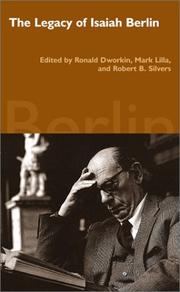| Listing 1 - 10 of 56 | << page >> |
Sort by
|
Book
ISBN: 9781350121430 Year: 2020 Publisher: London : Bloomsbury Academic,
Abstract | Keywords | Export | Availability | Bookmark
 Loading...
Loading...Choose an application
- Reference Manager
- EndNote
- RefWorks (Direct export to RefWorks)
'I gradually came to the conclusion that I should prefer a field in which one could hope to know more at the end of one's life than when one had begun.' So wrote Isaiah Berlin toward the end of the Second World War, when he decided to bid farewell to philosophy in favour of the history of ideas. In The Philosophy of Isaiah Berlin Johnny Lyons shows that Berlin's Damascene moment actually led him to a more original and engaging way of being a philosopher, since his approach to intellectual history amounted to the pursuit of philosophy by other means.Recasting Berlin as a philosopher who took humanity and history seriously, Lyons reveals the underlying unity of his wide-ranging and seemingly fragmented ideas. By painting Berlin in this new and more illuminating light, he throws into sharp relief the deep and enduring human interest of his thought.Lyons emphasises aspects of Berlin's thinking that have largely been neglected. These include his recognition of historical contingency and of the importance of truth in human affairs as well as his scepticism about determinism and account of why freedom should be valued. This introduction to Berlin's thought, and particularly its examination of these mainly overlooked views, reveals a new Berlin, one with surprising contemporary relevance to the debates that continue to dominate philosophy, politics and intellectual history today.
Multi
ISBN: 9781843834533 9781846156953 9781843838760 Year: 2009 Publisher: Woodbridge The Boydell Press
Abstract | Keywords | Export | Availability | Bookmark
 Loading...
Loading...Choose an application
- Reference Manager
- EndNote
- RefWorks (Direct export to RefWorks)
Book
ISBN: 9781316503058 9781316481448 9781107138506 Year: 2018 Publisher: Cambridge Cambridge University Press
Abstract | Keywords | Export | Availability | Bookmark
 Loading...
Loading...Choose an application
- Reference Manager
- EndNote
- RefWorks (Direct export to RefWorks)
Isaiah Berlin (1909-1997) was a central figure in twentieth-century political thought. This volume highlights Berlin's significance for contemporary readers, covering not only his writings on liberty and liberalism, the Enlightenment and Romanticism, Russian thinkers and pluralism, but also the implications of his thought for political theory, history, and the social sciences, as well as the ethical challenges confronting political actors, and the nature and importance of practical judgment for politics and scholarship. His name and work are inseparable from the revival of political philosophy and the analysis of political extremism and defense of democratic liberalism following World War II. Berlin was primarily an essayist who spoke through commentary on other authors and, while his own commitments and allegiances are clear enough, much in his thought remains controversial. Berlin's work constitutes an unsystematic and incomplete, but nevertheless sweeping and profound, defense of political, ethical, and intellectual humanism in an anti-humanistic age.

ISBN: 0006862446 Year: 1995 Publisher: London HarperCollins
Abstract | Keywords | Export | Availability | Bookmark
 Loading...
Loading...Choose an application
- Reference Manager
- EndNote
- RefWorks (Direct export to RefWorks)
Book
ISBN: 1108577687 1108693334 1316481441 Year: 2018 Publisher: Cambridge : Cambridge University Press,
Abstract | Keywords | Export | Availability | Bookmark
 Loading...
Loading...Choose an application
- Reference Manager
- EndNote
- RefWorks (Direct export to RefWorks)
Isaiah Berlin (1909-1997) was a central figure in twentieth-century political thought. This volume highlights Berlin's significance for contemporary readers, covering not only his writings on liberty and liberalism, the Enlightenment and Romanticism, Russian thinkers and pluralism, but also the implications of his thought for political theory, history, and the social sciences, as well as the ethical challenges confronting political actors, and the nature and importance of practical judgment for politics and scholarship. His name and work are inseparable from the revival of political philosophy and the analysis of political extremism and defense of democratic liberalism following World War II. Berlin was primarily an essayist who spoke through commentary on other authors and, while his own commitments and allegiances are clear enough, much in his thought remains controversial. Berlin's work constitutes an unsystematic and incomplete, but nevertheless sweeping and profound, defense of political, ethical, and intellectual humanism in an anti-humanistic age.
Book
Year: 1967 Publisher: London : George Weidenfeld & Nicolson,
Abstract | Keywords | Export | Availability | Bookmark
 Loading...
Loading...Choose an application
- Reference Manager
- EndNote
- RefWorks (Direct export to RefWorks)
Book
ISBN: 9781786838957 9781786838964 Year: 2022 Publisher: Cardiff University of Wales Press
Abstract | Keywords | Export | Availability | Bookmark
 Loading...
Loading...Choose an application
- Reference Manager
- EndNote
- RefWorks (Direct export to RefWorks)
Book
ISBN: 9781845952303 Year: 2016 Publisher: London Pimlico
Abstract | Keywords | Export | Availability | Bookmark
 Loading...
Loading...Choose an application
- Reference Manager
- EndNote
- RefWorks (Direct export to RefWorks)

ISBN: 0940322595 Year: 2001 Publisher: New York (N.Y.): New York review of books
Abstract | Keywords | Export | Availability | Bookmark
 Loading...
Loading...Choose an application
- Reference Manager
- EndNote
- RefWorks (Direct export to RefWorks)

ISBN: 0691026351 Year: 1996 Publisher: Princeton (N.J.): Princeton university press
Abstract | Keywords | Export | Availability | Bookmark
 Loading...
Loading...Choose an application
- Reference Manager
- EndNote
- RefWorks (Direct export to RefWorks)
| Listing 1 - 10 of 56 | << page >> |
Sort by
|

 Search
Search Feedback
Feedback About UniCat
About UniCat  Help
Help News
News